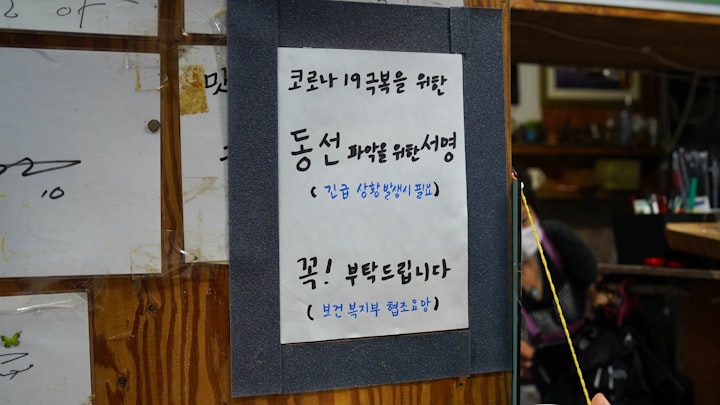Daebak! K-drama is teaching me Hangul
My first year in learning the Korean language has been an interesting one
I took Spanish during high school and French in college, and languages confuse me greatly! What tense do I use? Is that a masculine or feminine object? Does the subject go first or last in the sentence? Why does a pronoun have a different verb form than the actual object? I am all mixed up in languages. Then, I decided I wanted to learn Korean/Hangul. It is one of my student’s fault. He said - I think you would like this show that is on Netflix. Hooked at Asian drama, I joined Viki and binge-watched multiple shows.
I started watching Asian dramas. Two years later, I realized I had learned some words and phrases in Hangul. One year in Duolingo helped me acquire the basic alphabet. I could walk the streets of Seoul and correctly sound out every word I saw without understanding. Sounding out the letters is useless. Pronouncing B-l-u-e is no help if the word matches nothing in my understanding. That is what it is for me with Korean. I can read and sound out all the syllables. Where is the train? The bus? The bathroom? I am no help. But give me a drama where you can’t marry her; she is your sister! Ban Dae! I completely understand the storyline. The company's president accidentally sleeps with a low-ranking company employee and ends up marrying her because she is pregnant. He gets amnesia and does not remember their son. Years later, he sees a familiar boy on the playground but does not know why the Mom turns away from him in tears. I am ready to test drive my total lack of understanding of Korean after 18 months of Duolingo.
When I finally visit Korea, I am running for Soju. Everyone always drinks it in the dramas in green bottles. I have yet to figure out what I am supposed to call the young, hot bartender, though. Since I am over sixty years old, I will never use the term Oppa. It works wonders for a younger girl to get a young man to do something for her, primarily if she uses a high-pitched, little girl voice. I am unsure how I will respond if someone calls me Ajumma however, the term fits my age. A middle-aged woman named Ajumma often misbehaves, so maybe that may not be a good word for me. When something good happens - Assa! If I want to watch a historical Korean drama earlier than the 1900s, I look for Sageuk.
One thing that keeps tripping me up on Duolingo is the formal way of speaking with different styles.
Jon Dae Mal - Mind your manners, as my Granny would say. Seniors expect a formal speech from their juniors.
Aniyo is an important word to know - otherwise, you might agree to crazy things. Just say Aniyo, um, no. That works in formal and informal situations. I watched hundreds of episodes of shows before I realized ne means yes. It flies by so quickly that translation misses the word quite often.
I watch several Korean drama shows, and there will be this long phrase. Seriously, the actor may speak for several seconds. The translation will be “She said hello.” Then I realized that this was ‘Hi.’ Annyeong Haseyo. Eight syllables for what would be one in English. The language is lovely to hear as it is lyrical. The sentences often go up in pitch even though there is no asked question.
Once I realized that pronouns rarely are used, I started focusing on learning verbs. I still have a long way to go because I spend more time playing games on my phone and watching dramas than studying. Still, I know the important ones.
Jo-a-hae like you (informal)
Sa-lang-hae love you (informal)
Daebak (Wow), I have a long way to go to learn Hangul (Korean)
Fighting! Hwaiting.
About the Creator
Cat Turner
My stories range from the whimsical to the down and dirty of a serial killer. A balanced left and right brain with my varied life experiences make me an eccentric bird. I have been blogging two years now. I hope you enjoy my stories.
Reader insights
Outstanding
Excellent work. Looking forward to reading more!
Top insights
Compelling and original writing
Creative use of language & vocab
Easy to read and follow
Well-structured & engaging content
Excellent storytelling
Original narrative & well developed characters
Expert insights and opinions
Arguments were carefully researched and presented
Eye opening
Niche topic & fresh perspectives
Heartfelt and relatable
The story invoked strong personal emotions
Masterful proofreading
Zero grammar & spelling mistakes
On-point and relevant
Writing reflected the title & theme







Comments (10)
Hi we are featuring your excellent Top Story in our Community Adventure Thread in The Vocal Social Society on Facebook and would love for you to join us there
Found the website https://www.yourprimeservice.com/, where you can find an appliance repair specialist. They provide quality services available for any orders. First of all, they have all the contacts in the app. It is easy to contact the manager and stipulate all the details. The quality, time and price is always satisfying. The home delivery service is also nice.
All I can say is...I totally get it. My thing is anime, but when that started running out on Netflix and I was waiting for new episodes on Crunchyroll, I ended up watching a lot of K-dramas. It was an easy shift since I love K-pop. Then all the sudden, here I was picking up on Korean words. LOL
It's really nice
잘했어요, we’ll done! All the best with further learning! 화이팅 🦾
잘했어요 👏🏾
hi. Excellent work. keep it up.
Reminds me of some of the obstacles I had studying Japanese. You have to step outside yourself to get into another language. Thank you for the reminder! ;)
Learning Korean with dramas is great. It's fun and interesting
고생했어요 !